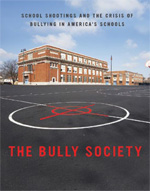Assistant Professor of Sociology Jessie Klein, Ph.D., has attracted attention for her research and book on bullying.
By Charity Shumway
Published by NYU Press in March 2012, The Bully Society: School Shootings and the Crisis of Bullying in America’s Schools by Adelphi University Assistant Professor of Sociology Jessie Klein, Ph.D., has attracted attention from public and independent school leaders, academics, nonprofit leaders and the media. Because of the book, Dr. Klein has been invited to comment on incidents of school violence by CNN and WNYC Radio, among others.
Rather than seeing school shootings as extreme aberrations, through extensive interviews with students, teachers and parents, Dr. Klein has come to see shootings as something more troubling. “School shooters were telling us in the most brutal and horrific way what was going on in schools generally,” Dr. Klein says. It’s a bold thesis and one that has drawn controversy, particularly in the pages of The New York Times. School communities are at the heart of Dr. Klein’s book. To address bullying, many U.S. schools have adopted zero tolerance policies, excluding students through suspensions and expulsions. Dr. Klein sees this as a failure.
“Most students who have been bullies have also been victims,” she says, “and it’s the wrong way to go, profiling the bully or the victim.” Instead, Dr. Klein proposes that we should work to change school communities more broadly. “We need to find a way to help students feel responsible to one another.”
Dr. Klein’s research identified a number of factors that contribute to hostile school environments. Schools that stress hyper-independence over community leave students in need feeling like they have no one to rely on but themselves. Many school shooting perpetrators say they felt that they had no one to turn to and that they believed they had no choice but to take matters into their own hands. “We have this idea that schools are supposed to be about knowledge, not the emotional support of a human being. We are expecting too much from kids,” Dr. Klein says.
Dr. Klein also identified a pernicious culture of normative gender that contributes to school hostility. “Most of the slurs that kids get called relate to gender and sexuality,” Dr. Klein says. Boys often feel they are allowed to express anger, but if they show sadness or other vulnerabilities, they are called names likening them to girls or homosexuals. Girls are also committing more violence than in previous decades and find they, too, are pressured to be masculine, meaning aggressive and violent. Students who committed school shootings were often teased for not measuring up on these kinds of gender norms. Dr. Klein argues that opening up the continuum of what it means to be masculine, in particular, is critical to changing school bully societies.
Ultimately, Dr. Klein’s book concludes that we need to help students become leaders in their schools, committed to creating compassionate communities. “Schools can be the hope for our future if they develop communities where students can bond with each other and be there for one another,” Dr. Klein says. “The difference when students feel supported by their community is phenomenal.”
For further information, please contact:
Todd Wilson
Strategic Communications Director
p – 516.237.8634
e – twilson@adelphi.edu
